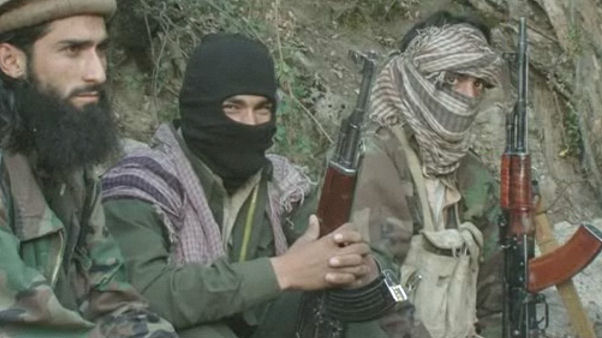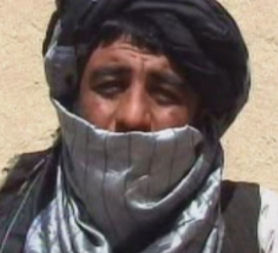Taliban view: Nato troops ‘cannot win’
Channel 4 News meets with a senior Taliban commander who says “this war cannot be won” by foreign troops as Alex Thomson examines rare footage of life on the frontline with insurgent fighters.

Living with the Taliban on the Afghan frontline
Channel 4 News Chief Correspondent Alex Thomson looks at rare film of Taliban fighters on the frontline and explains what it tells us about the insurgents and their tactics.
It all starts with the moment when you move beyond the point of return. When the RV finally takes place up some distant mountain track in the east of the country in this case, Kunar Province.
“Unsmiling, heavily armed fighters suddenly materialise and then there you are, out there, on your own.” Alex Thomson
Unsmiling, heavily armed fighters suddenly materialise and then there you are, out there, on your own, with nothing but trust to keep you going. From behind their turban-masked faces they are smirking, saying quietly to each other, “He’s really scared of us, isn’t he?” And so it went on for the whole of the first day as they trekked back up to their command post.
Day two and things had calmed a little.
Commander Dawran – who set the whole thing up – made it plain that Refsdal is a guest. And that is that. Under Afghan custom they will now pretty much lay down their arms to protect him. Rather, on this occasion, than shoot or behead him as a suspected spy.
And by the second day the faces are being revealed, they are laughing around and joking: “If I appear in this people are going to say ‘Who’s the country boy?'” His mate laughs and adds: “He’s filming us all to say look here – these are the bad guys.” And things begin to fall into something of a routine.
The men have a heavy machine gun of fairly ancient origin placed to cover an ambush point on a road used almost daily by the US military. There is no problem filming them as they discuss ambush plans, set it up and execute it. There is much celebration when they claim to hit an American vehicle with a short burst from their primitive gun emplacement high above the snaking mountain road.
But, try as I do, I see no vehicle hit on the camera, at any rate. Commander Dawran lectures his men saying: “During the Russian invasion, someone asked me when the victory will come? The answer was, if the holy warriors are honest and fight only for the sake of God, then victory will come soon. If not, it will take more time.”
“There is much celebration when they claim to hit an American vehicle with a short burst from their primitive gun.” Alex Thomson
He compares the motives for the insurgents fighting with those of the west, the Americans – for this is both a US dominated war and they are in a US area of operations: “We fight for our freedom, our religion and we fight for our holy land. We are fighting for these goals. What are their goals? For what are they fighting us? Are they oppressed? Have they been treated unfairly? Are they living in a dictatorship?”
Mullar Nasir, believed to be the Taliban’s current “field commander”, said that “his forces will not stop fighting while foreign troops remain”.
Nasir has directly taken part in battles against British and US forces in Marjah, Helmand province.
In February 2010 Channel 4 News was given exclusive access to Nasir and the Taliban “top team”. Our cameraman was taken, blindfolded, to an unknown location close to the Pakistan border.
He filmed the group playing volleyball in the sun – a display of their ability to blend into normal village life.
“They should consult Afghan history. No force on the face of the earth has defeated the Afghans so far.” Mullar Nasir
Nasir spoke in detail about the confidence of the Taliban, underlining his belief that coalition forces are doomed to failure. He sent a stark message to western troops.
He said: “They should consult Afghan history. No force on the face of the earth has defeated the Afghans so far. The Russians were defeated and so are they.
“My message to the whole of the west, especially the parents of those soldiers who are fighting for America’s vested interests in Afghanistan is that they should not trust the American propaganda.
He also issued a warning directly to the parents of soldiers sent Afghanistan, urging them not to “sacrifice their sons” in the interests of US, repeatedly insisting “this war cannot be won”.

Who are the Taliban?
Taliban derives from the word "taleb" which means student or "seeker of knowledge" in Arabic.
The Taliban movement grew from Islamic students, many educated in madrasas in Pakistan and most from backgrounds in Afghanistan's rural Pashtun areas.
The seeds of the Taliban began growing after the Soviet invasion of Afghanistan in 1979. The Russians supported the Marxist government against mujahideen rebels.
This was the Cold War era and so the Afghan mujahideen were in turn supported with funding from the Americans to help fight the Russians.
The Afghan mujahideen also received backing from "volunteer" foreigners, including a rich Saudi - Osama bin Laden.
The Russians withdrew defeated in 1989, leaving a country in turmoil and controlled by rival warlords and mujahideen factions.
The chaos paved the way for a new kind of order, and the ultra-puritanical Taliban grew stronger with their strict interpretation of Islam and Sharia law.
In 1994, a former mullah, Mohammad Omar, became the leader of the Taliban and remains ruler today. In the same year the Taliban took control of Kandahar, followed later by Herat in 1995 and Kabul in 1996.
The Taliban declared the Islamic Emirate of Afghanistan in 1996 and Pakistan recognised the group as legitimate rulers in 1997.
The Taliban governed 95 per cent of Afghanistan until the US-led invasion in 2001.
He added that the Taliban have the capacity to force allied troops from Afghanistan and that the tide has already turned against the Americans.
“They (the United States) had announced in the start of the current year that they would stay for about 40 years in Afghanistan but after increasing attacks on their troops they were forced to change their stance within weeks and announced to withdraw forces from Afghanistan in 2011.
“Let me tell you, if we intensify the attacks on them further it wouldn’t take much time to change their withdrawal plan from weeks to moments.” Mullar Nasir
“The Canadians and Hollanders also announced their withdrawal plan as well. Let me tell you, if we intensify the attacks on them further it wouldn’t take much time to change their withdrawal plan from weeks to moments. They can not stay for even a year.
“Scores of fighters are ready to reach the area and provide support to the Taliban who are fighting the allied forces – even though the local Taliban [in Marjah] are strong enough to tackle the situation and don’t actually need reinforcement.
“We have planted landmines everywhere in the area – it’s hard for Nato to even take a step.”
Nasir also made allegations about “payoffs” from Nato forces. He said the Taliban had been offered money in order to allow convoys safe passage.
“I had also been offered US $30,000 per convoy by the Polish soldiers to provide them safe passage,” he said.”The very next day of the $30,000 offer, we attacked one of their convoy and inflicted millions of dollars losses on them.
“We called the jirga members and asked them what they say now after the losses had crossed millions in dollars. The torched vehicles are still present in the battlefield.”
Mullar Nasir’s claims were immediately rejected by former army captain Patrick Hennessey, who took part in an operational tour of Afghanistan in 2007.
“In my experience, from long nights listening to radio intercepts, when were about to be attacked by 300 mililtants with tanks – then 10 guys would attack us and five would run away.” Patrick Hennessey
He told Channel 4 News the Taliban were “good at PR”.
He said: “It’s unprecedented, it’s really interesting to watch [the film]… it’s putting on that very carefree ‘look at us’, we’re playing volleyball…
“I was reminded slightly, watching it, of those transmissions we saw of 2003 of the Iraqi information minister saying ‘no tanks here’ as the Americans were rolling into Baghdad.
He explained: “In my experience, from long nights listening to radio intercepts, when were about to be attacked by 300 mililtants with tanks – then 10 guys would attack us and five would run away.
“Poll after poll has shown the Afghans don’t support what this man and his bodyguards stand for. People like these are out on the fringe.”
Nato targets the Taliban, blogs Nick Paton Walsh
Having several leading Taliban figures in jail must surely improve the information you have at your disposal about who to talk to and what about.
Nato's commander, Stanley McChrystal, saw great success targeting insurgent leaders when he ran special forces in Iraq. The insurgency there died down, after a lot of political deals were added into the mix. He must be hoping the same is true in Afghanistan. And enjoying the obvious kudos of picking up top Taliban like matchsticks. Nato and Obama badly need good headlines right now.
But without wanting to appear like a textbook "doom and gloom" merchant, as one friend in the British army recently called me, there are some drawbacks to arresting Taliban leaders.
Firstly, and most obviously, these men will be replaced. And pretty quickly; previous such arrests or assassinations have not stopped the insurgency building to the domineering place it is now.
Secondly - one British officer told me after a similar campaign to kill insurgent leaders in Helmand over a year ago - taking these experienced fighters out of the mix can lead to greater chaos. The leaders at least command their men at times, and can be talked to.
Their successors are often younger, and in the case of the Helmand operation I referred to, were more radical, violent, and, broadly, very hard to negotiate with. Helmand actually became a messier place - according to this interpretation - after these targeted hits.
Read more